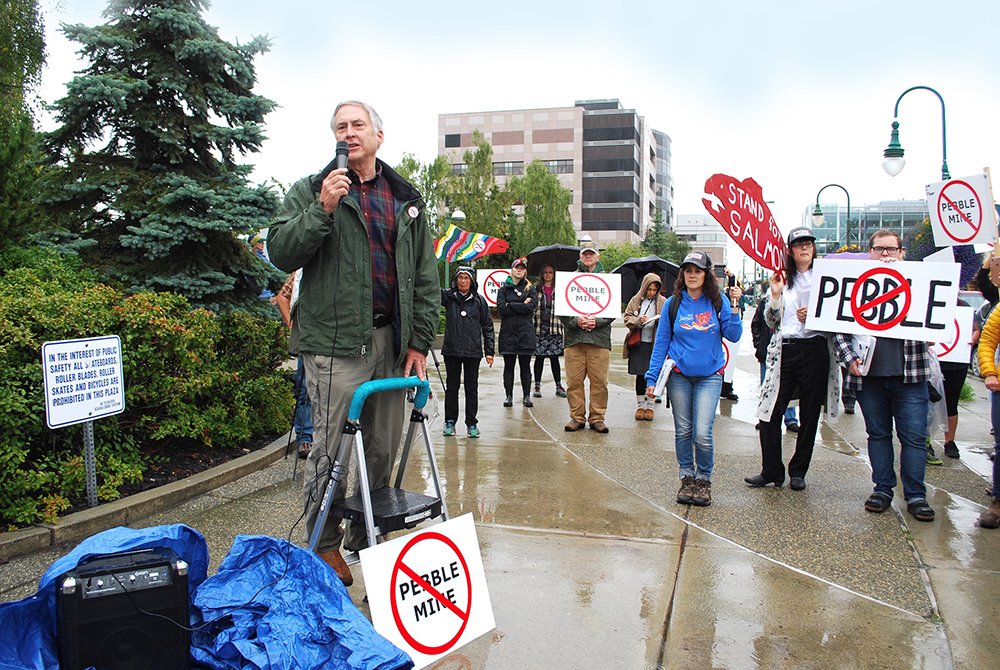
A final determination released in late January by the Environmental Protection Agency (EPA) regarding plans for a proposed mine adjacent to the Bristol Bay watershed in Southwest Alaska favors protections for the huge run of wild sockeye salmon and a multi-million-dollar fisheries economy.
The EPA said its determination would protect waters important to sustaining the area’s salmon resources from disposal of dredged or fill materials associated with the copper, gold and molybdenum Pebble deposit that a Canadian mining firm wants to develop.
The battle over the proposed development has been ongoing for two decades.
“EPA has determined that specific discharges associated with developing the Pebble deposit will have unacceptable and adverse effects on certain salmon fishery areas in the Bristol Bay watershed,” Radhika Fox, the EPA’s assistant administrator for water, said.
“Our final determination helps prevent those adverse effects while helping protect a vibrant and magnificent watershed. It’s also important to note that EPA’s action does not apply to other resource development projects in Alaska.”
Port of Seattle Commissioner Fred Felleman was quick to declare the EPA’s decision cause for celebration.
“The Port of Seattle celebrates the Biden administration, U.S. Senator Maria Cantwell, and the rest of the Washington congressional delegation, for their sustained efforts to preserve the Bristol Bay watershed, which has resulted in today’s historic accomplishment,” he said. Felleman also noted the alliance of the port with the fishing industry in opposition to mining and other proposals that threaten the watershed.
“Commercial fishing is a critical part of the cultural and economic fabric of our port, city and region,” Felleman said. “The EPA’s decision provides significant safeguards for the future of this incredible ecosystem and the sustainable fisheries it supports.”
“Today is a great day for Bristol Bay, and one that many thought would never come,” said Jason Metrokin, president and chief executive officer of the Bristol Bay Native Corp. “Nevertheless, we know the fight over our region’s future is not over. BBNC will continue its advocacy to ensure Bristol Bay will always maintain its salmon-based culture and economy, while creating new opportunities across the region.”
Katherine Carscallen, director of Commercial Fishermen for Bristol Bay, shared her optimism.
“For the first time in two decades, our fishermen will head out on the water this fishing season without the existential threat of Pebble Mine looming just up-river,” she said. “Thousands of small fishing businesses and industry members are thanking the Biden administration and the Environmental Protection Agency for finalizing Clean Water Act protections which recognize the importance of Bristol Bay, its record-breaking salmon runs and the irreplaceable sustainable jobs it supports.”
“It is good cause for celebration, but should be taken with the caution that lies repeated often enough and with enough money and power can never be totally disregarded,” said Rick Halford, former Alaska State Senate president, and an avid outdoorsman, who is outspoken on the need to protect the Bristol Bay watershed.
It’s good to keep in mind, Halford said, that anything that can be done by regulation can be undone by regulation.
John Shively, the CEO of the firm behind the mining project, Pebble Limited Partnership, labeled the EPA decision an unlawful and unprecedented preemptive veto.
“This preemptive action against Pebble is not supported legally, technically or environmentally,” he commented. “As such, the next step will likely be to take legal action to fight this injustice.”
The PLP is a subsidiary of Hunter Dickinson Inc., a diversified, global mining group headquartered in Vancouver, B.C.
Alaska Gov. Mike Dunleavy said “EPA’s veto sets a dangerous precedent. Alarmingly, it lays the foundation to stop any development project, mining or non-mining, in any area of Alaska with wetlands and fish-bearing streams.”
Alaska’s opportunity to show the world a better way to extract the state’s resources “should not be unfairly preempted by the federal government,” he said.
The final determination prohibits certain waters of the South Fork Koktuli River and North Fork Koktuli River watersheds from being used as disposal sites for the discharge of dredged or fill material for construction and routine operation of Pebble partnership’s mine plan. The firm described the plan in its June 8, 2020 Clean Water Act Section 404 permit application.
The final determination further restricts the use of certain waters of the South Fork Koktuli River, North Fork Koktuli River and Upper Talarik Creek watersheds as disposal sites for the discharge of dredged or fill material associated with future proposals to develop the Pebble deposit that would result in adverse effects similar or greater in nature and magnitude to those associated with the 2020 Mine Plan.
Another vocal opponent of the mine, Rep. Jared Huffman, D-Calif., hailed the EPA’s decision as a hard-won victory for the region’s tribes and residents whose lives and livelihoods depend on the thriving fishery.
“Millions of people—including commercial and sport fishers, tribes, businesses, chefs, and others—made their voices heard over the last decade, bringing us to this pivotal moment,” Huffman said.
Alannah Hurley, executive director of United Tribes of Bristol Bay, called the announcement “historic progress.”
“Under President Biden, the EPA has not only restored its commitment to science and law but truly listened to the original stewards and first peoples of this land. Ignored by our own state government, our Tribes petitioned the EPA 13 years ago to use its 404(c) authority to protect Bristol Bay, to protect our people,” she said.
Cantwell, D-Wash., called the EPA’s decision “the final nail in the coffin for the Pebble mine. The science is clear, the mine would have devastated Bristol Bay salmon and the thousands of hardworking families that depend on salmon for their livelihoods, subsistence and recreation,” she said. “Now we will have a thriving Bristol Bay salmon run for generations to come.”
